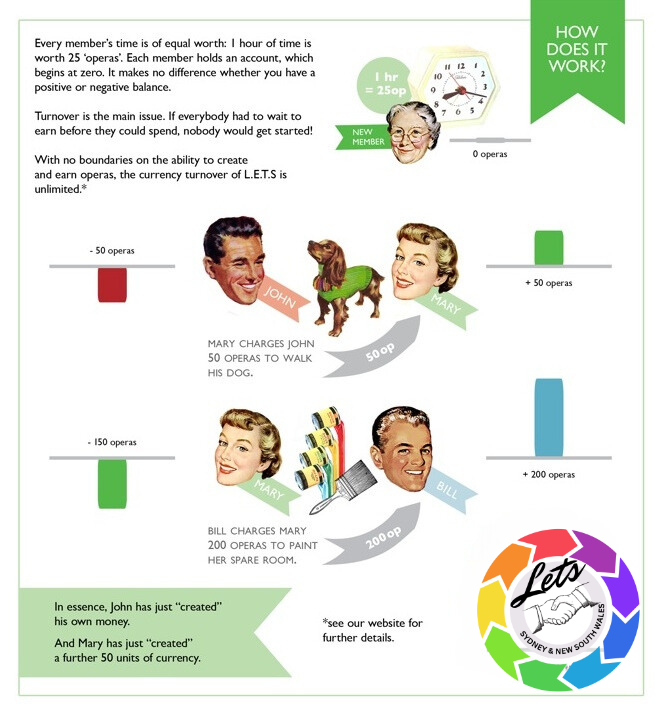LETS has been described as “a bank which has an unlimited line-of-credit giving members the ability to ‘print’ their own money”.
Whilst this utopian concept is not strictly true, it is on the right track. Unlike federal dollars which are issued and controlled by the government, operas are created by members every time they trade.
Each member holds an account which begins at zero. John pays Mary 40 operas for babysitting. Mary’s account is now +40 operas and John’s account in now -40 operas. In essence, John has just “created” his own money.
Mary then pays Bill 80 operas for carpentry work. Bill’s account is now +80 and Mary’s account is now -40. Mary has just “created” a further 40 units of currency.
With no boundaries on the ability to create and earn operas, the currency turnover of a LETSystem is unlimited.

Exploring this concept further…
“Operas” only exists as numbers in accounts, moving from one account to another.
You can’t hold them, you can’t lose them – you can only trade them. For one account to move up, another account MUST move down. So at any one time approximately half of the members will be in “credit’ and the other half will be in “commitment”.
The sum of negative balances and positive balances = 0.
For every member with a positive balance there MUST BE a member with a negative balance.
Being in “commitment” (negative balance) is an essential feature of a LETsystem, so it is not viewed as bad and wrong (ie. debt). A commitment is simply a willingness to supply goods or services to other members at some future date.
In a healthy system, account balances bob up and down, sometimes having a balance in credit and sometimes in commitment.
It makes no difference whether you have a positive or negative balance.
TURNOVER is the main issue. The most successful members are those with a high turnover because that means that the system is working for them.
Members do not have to have operas before they can spend them. Sydney LETS encourages members to go into commitment with their first trade. If you wait to earn before you spend, you could find it slower to start trading. If everybody had to wait to earn before they could spend, nobody would get started! You can start now, click here to JOIN >>
Creating a more equal society…
Now that you have your head around how to trade in operas, lets explore how operas can be used to value members time and skills more equally.
“THINK OUTSIDE THE SQUARE”.
Throw off all the confines of ‘federal dollar thinking’ and adopt a philosophy more conducive to community trading.
Time is valuable – and everyone’s time should be of equal worth.
In the “real world” a masseuse can charge $85 an hour because that is what the market will tolerate. The man who mows the lawn can charge $50 because it is considered ‘hard’ work. But that same masseuse or lawnmower man will balk at paying their babysitter $30 an hour.
WHY?
Isn’t the care of your child worth equally as much as getting a massage?
Do you value your lawn more than your offspring?
LETS gives you the opportunity to think beyond the materialistic, monetary value of services and instead, honours people for their energy and committment to helping create a closer community.
Leave behind the entrenched ideas of money, profit, credit, debt, greed & poverty.
Start thinking in terms of time-dollars. One hour is worth 35 operas. Whether you are skilled or unskilled, whether you have spent 3 years at Uni getting a piece of paper, or 20 years as a seamstress perfecting your skills – your time is valuable.
To see how LETS and time-dollars works in practice and to get a better idea how you can contribute to the system, please read the Benefits.

